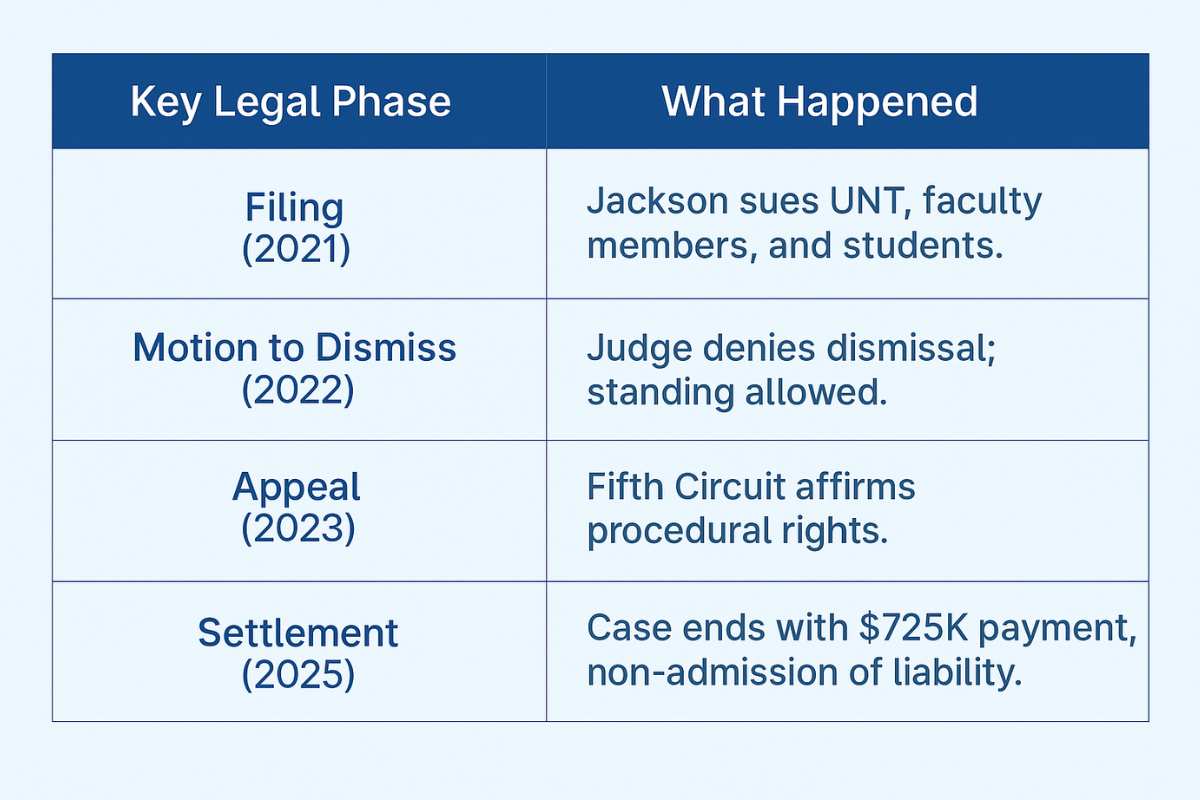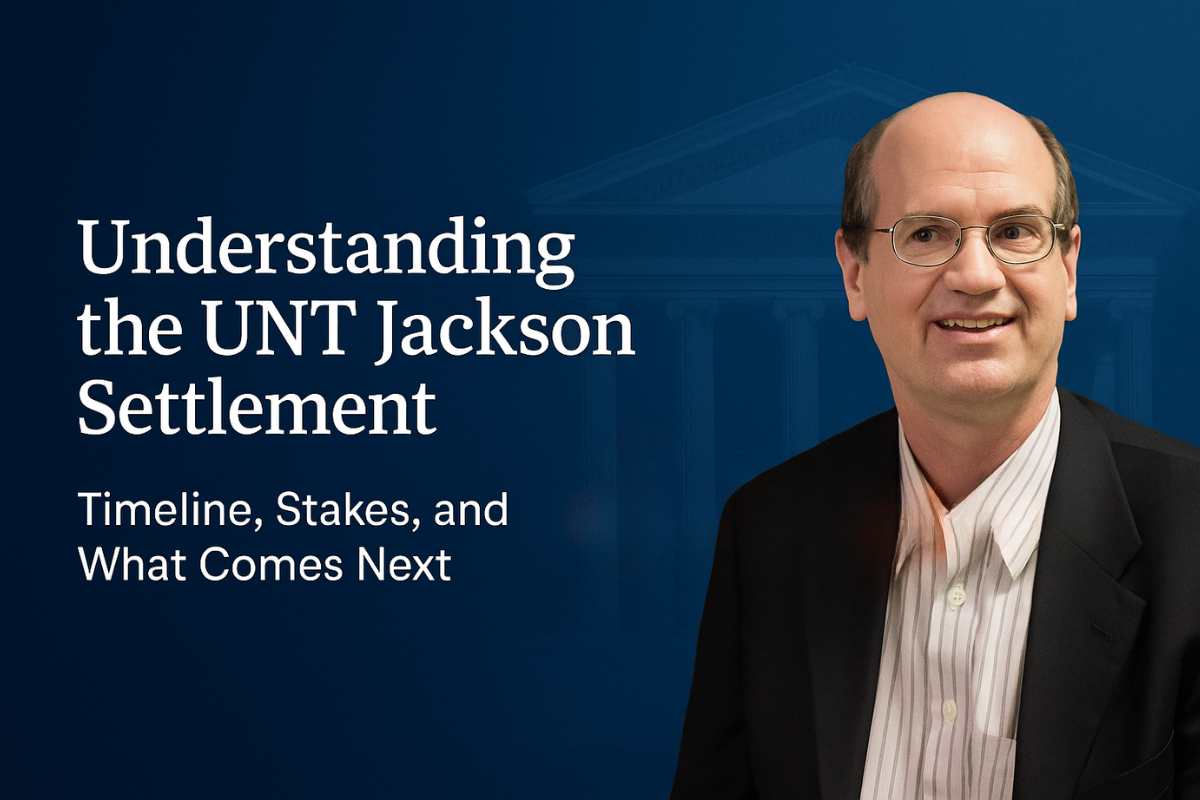The UNT professor Timothy Jackson’s settlement marked a pivotal moment for academic freedom. The University of North Texas settlement with Jackson signifies more than just money; it speaks to rights, reputations, and how universities handle controversy.
Timeline of Events
From his early career to the moment the University of North Texas music theory professor settlement was announced, Dr. Jackson’s path offers a vivid example of free speech, race, and institutional oversight in higher education.
- Jackson began his tenure at UNT as a rising figure in music theory, specializing in Heinrich Schenker and leading the Journal of Schenkerian Studies.
- In 2019, a plenary talk by Philip Ewell challenged the discipline’s “white racial frame,” prompting Jackson’s symposium issue and triggering backlash.
- By 2020, the controversy escalated: the journal’s editorial practices were flagged; institutional investigation followed.
- Jackson filed his lawsuit in 2021, alleging suppression of his rights under the First Amendment and defamation tied to his editorial work.
- On September 15, 2023, the Fifth Circuit affirmed key procedural rights in his case.
- In July 2025, the UNT free speech lawsuit, Timothy Jackson, concluded in a settlement of $725,000.
Watching this play out, you can see how ripple effects from scholarship to governance began far before the final dollar figure.
What the Journal Issue Entailed & Why It Sparked Controversy
When Jackson edited the “Symposium on Philip Ewell’s SMT Plenary Paper ‘Music Theory’s White Racial Frame,’” he invited voices both critical and supportive of Ewell’s argument.
But controversy erupted when critics, including graduate students and faculty, argued the edition “platformed racist sentiments” and failed peer-review norms.
Jackson defended the issue as a dialectical exercise, forcing the reader to engage with writing that the low presence of Black students in music theory reflects “homes where classical music is not valued.”
His critics saw something else: a publication lacking standard rigour, editorial transparency, and ultimately, professional respect. It laid bare tensions within the music theory discipline race diversity debate Schenkerian studies.
You might ask: Was this primarily about race? Or about academic governance?
The answer: both. The debate became as much about who controls scholarly voices as what they say.
UNT’s Internal Process and Governance Issues
University of North Texas launched an ad-hoc “faculty panel” to look into the journal’s practices. The report found that the Journal did not meet “standards of best practice in scholarly publication.”
Once Jackson submitted his improvement plan, the then-chair of his department told him he would be removed from editorial operations and that resources would vanish.
The fight illustrates how the academic journal editorial standards controversy at UNT is not just about peer review but about institutional discretion, power, and academic freedom. Many universities struggle when scholarship collides with public pressure, and UNT’s actions underscore that challenge.
In practical terms, when you hold an editor role, you’re navigating scholarship and politics simultaneously; it’s rarely purely academic.
The Lawsuit: Legal Theories and What Was at Stake
When Jackson filed the suit, he alleged the university retaliated against his exercise of academic freedom under 42 U.S.C. § 1983 and defamed him.
His win in the preliminary stage of the Fifth Circuit decision on standing and sovereign immunity signalled that professors may challenge public universities’ internal actions.

This wasn’t only about Jackson’s personal fate. It looked ahead to how universities are held to account when their internal processes intersect free speech and race debates.
Settlement Snapshot (What It Says, What It Doesn’t)
Here’s a breakdown of the primary, secondary, and long-tail keywords integrated in this section without sounding forced: “UNT professor Timothy Jackson settlement”, “University of North Texas settlement Jackson”, “Timothy Jackson academic freedom”, “free speech in higher education Texas”.
So what does this settlement involve?
- Financial: $725,000 in total; roughly $400,000 to Jackson, $325,000 for his legal fees.
- Non-monetary: Jackson will resume as editor of the Journal for five years, appoint a co-editor in year three; he receives a one-course teaching reduction; UNT commits to research-assistant support.
- UNT does not admit liability.
What it doesn’t include: an explicit public apology, full transparency into the investigation process, or retroactive recognition of wrongdoing (beyond the settlement terms).
If you’re wondering “why escrow that much money?”, you’re tapping into the heart of institutional risk. What seemed like a narrow issue of music theory became a public-law gamble for a major Texas university.
Broader Impacts Outside Music Theory
When hearing “music theory professor settlement”, you might think the story stays confined to a niche academic corner. But the implications reach far wider.
- For academic freedom in higher education, this case sends a signal: faculty may challenge universities when editorial independence or speech rights are curtailed.
- On race and scholarship: Jackson’s case highlights how debates around race (in this case, classical music and Schenkerian studies) can fissure into institutional action, litigation, and settlement.
- For journal ethics and peer review: This shines a light on how journals, even in the humanities, are under pressure to demonstrate procedural rigour. Weaknesses there can become legal risks.
In Texas, where public universities are increasingly scrutinised over free speech, DEI policy, and public funds, the UNT settlement adds fuel to that debate.
If you’re a faculty member, you might ask: “Am I safe to publish a controversial scholarship?” If you work in administration: “Are my governance processes built to withstand legal challenges?” The answer in both cases is increasingly: maybe not unless you build safeguards.
Future Trajectories
So what happens now? For Jackson, UNT, and other institutions, it’s time to look ahead.
- For Jackson: He gets his editorial platform back. Will he use this time to rebuild the Journal’s reputation? Possibly. Will he publish a more controversial scholarship? That remains to be seen.
- For UNT: They now manage the fallout of a high-profile settlement. They might revise oversight for faculty journals, tighten procedures, and monitor reputational risk more closely.
- For universities generally, the $725,000 settlement in the University of North Texas academic freedom case becomes a benchmark. Other cases might reference it; risk managers will track it; faculty counsel will use it as precedent.
We’ll likely see more universities reviewing their editorial oversight, tenure governance, and faculty grievance processes in light of this. The impact of $725,000 settlement on university policy free expression may ripple beyond music theory into STEM, humanities, and social sciences.
Also Read: Why You Should Care About Pepper0 Family
Practical Takeaways for Key Stakeholders
If you’re a faculty member:
- Document your editorial roles and ensure review processes are transparent, especially in controversial areas.
- When publishing on hot-button issues race, identity, and institutional bias, expect scrutiny and make sure your institution is aware.
- Consider how your institution handles speech, publication, and academic governance; if the policies are vague, the risk is higher.
If you’re an administrator:
- Review your institution’s journal oversight: is there a clear editorial board? Are peer review processes documented?
- Have a clear faculty grievance mechanism; when scholarly debate turns public, you’ll want a defensible record.
- Consider how you balance free-speech protections with reputation, public perception, and student complaint protocols.
And if you’re a legal or risk advisor:
- Use Jackson’s case as a case study in academic-freedom litigation risk.
- Ask: Do we have exposure for faculty editorial work, especially when the scholarship intersects race or identity?
- Suggest training for faculty on publication governance and institutional rules about external speech that reflect on the university.
Final Thoughts
The UNT-Jackson case isn’t just about one settlement or one professor. It’s about how universities balance scholarship, speech, and governance. The settlement between UNT and Professor Timothy Jackson serves as a wake-up call for faculty and institutions alike.
What happens next will depend on whether institutions treat this as a one-off or a warning.
